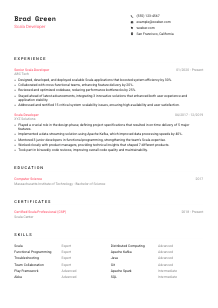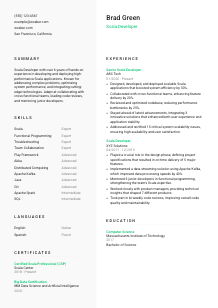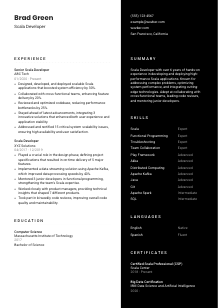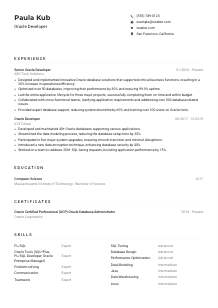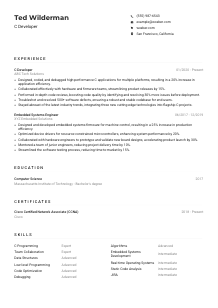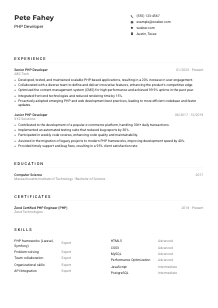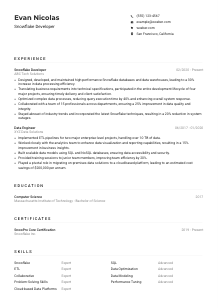Scala Developer CV Example
Embracing the functional, but not your CV? Dive into this Scala Developer CV example, constructed with Wozber free CV builder. Uncover how fluently you can fuse your Scala talents with job requirements, scripting a career as robust and elegant as your code!
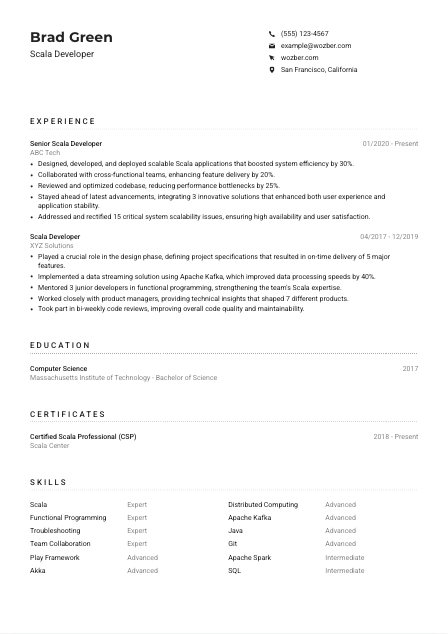
How to write a Scala Developer CV?
Hello, passionate Scala Developer-in-the-making! So, you've set your sights on that dream Scala Developer role, navigating through the sea of job postings until one caught your eye. Now, it's time to bridge the gap between your capabilities and what the employers are looking for with a CV that speaks volumes. Using a free CV builder like Wozber, we'll guide you through crafting a CV that's not only a mirror reflection of the job requirements but also optimised for Applicant Tracking Systems (ATS).
Ready to sculpt your CV into your job landing ticket? Let's write your success story, line by line.
Personal Details
This section might seem straightforward, yet it's the cornerstone of your CV. It's where you lay the groundwork, ensuring every detail is tailored to the Scala Developer role. Let's lay out the blueprint.
1. Make Your Name Shine
Your name is the marquee of your personal brand. Use a clear, professional font and let it stand out. It's the first thing the hiring manager sees, so make it memorable.
2. Mirror the Job Title
Immediately below your name, position yourself as the perfect candidate by echoing the job title, "Scala Developer." This strategic placement primes the hiring manager's perception, aligning you with the role from the get-go.
3. Precision in Contact Information
List your most reliable contact number and a professional email formatted as firstname.lastname@email.com. Accuracy here is non-negotiable; you wouldn't want a typing error to be the roadblock to your next opportunity.
4. Location, Location, Location
The job specifies San Francisco, California. By matching this in your CV, you reassure the employer of your availability, sidestepping any relocation concerns they might have.
5. A Link to Your Professional World
If you have a LinkedIn profile or a GitHub repository showcasing Scala projects, include it. It's a window to your professional persona and adds depth to your CV.
Takeaway
The Personal Details section is more than administrative info; it's the initial handshake with your future employer. Get it right, and you've set the stage for a great first impression. Keep it professional, accurate, and relevant to the Scala Developer position.





Experience
The Experience section is where your Scala journey shines brightest. Here's how to mold your experiences into a compelling narrative that demonstrates you're the prime candidate for the role.
- Designed, developed, and deployed scalable Scala applications that boosted system efficiency by 30%.
- Collaborated with cross‑functional teams, enhancing feature delivery by 20%.
- Reviewed and optimised codebase, reducing performance bottlenecks by 25%.
- Stayed ahead of latest advancements, integrating 3 innovative solutions that enhanced both user experience and application stability.
- Addressed and rectified 15 critical system scalability issues, ensuring high availability and user satisfaction.
- Played a crucial role in the design phase, defining project specifications that resulted in on‑time delivery of 5 major features.
- Implemented a data streaming solution using Apache Kafka, which improved data processing speeds by 40%.
- Mentored 3 junior developers in functional programming, strengthening the team's Scala expertise.
- Worked closely with product managers, providing technical insights that shaped 7 different products.
- Took part in bi‑weekly code reviews, improving overall code quality and maintainability.
1. Understand the Job Requirements
First off, dissect the job description. For instance, this role demands a strong foundation in using Scala frameworks like Play and Akka, and experience in distributed computing technologies. These are your keywords and guiding stars.
2. Organize Your Scala Saga
Structure your experience in a clear, reverse-chronological order. Lead with your most recent role, ensuring that every position listed directly aligns with the Scala realm. This tells the story of your evolving expertise.
3. Highlight Your Scala Achievements
For each role, pinpoint contributions that resonate with the job ad, like your implementations using Apache Kafka or Spark that led to measurable improvements. Quantify these achievements to lend them weight.
4. Quantify Your Scala Contributions
Whenever possible, anchor your achievements with numbers. Improved system efficiency by 30%? Mention it. Numbers grab attention and provide a tangible measure of your impact.
5. Relevance is Key
Keep the focus sharp. Unrelated achievements, no matter how impressive, dilute the narrative. Stick to the script - your Scala development story.
Takeaway
Your experience section is the core of your Scala Developer CV. Tailor it meticulously to the job requirements, and don't shy away from celebrating your achievements. Remember, every detail here is a step closer to that Scala Developer role.
Education
Even the sharpest skills are built on a solid educational foundation. Let's sculpt your Education section to reflect just that.
1. Pinpoint the Educational Requirement
In this case, a Bachelor's degree in Computer Science or a related field is sought. If your degree aligns with this, you're already ticking a crucial box on the employer's checklist.
2. Keep It Structured
Present your educational background clearly: Degree, Field of Study, University, Graduation Date. It's straightforward yet informative.
3. Emphasize Relevance
If your degree directly applies to a Scala Developer role – perhaps with a focus on computer science or engineering – make that connection clear. Accuracy here connects dots for the hiring manager.
4. Relevant Courses Could Add Color
In some cases, listing courses related to Scala development or functional programming can underscore your preparedness, especially if you're early in your career.
5. Show Off Your Scala-specific Education
Did you complete a project, coursework, or thesis particularly relevant to Scala or software development? Mention it. This highlights your dedication and specificity toward the Scala domain.
Takeaway
Your educational background lays the groundwork for your expertise. Tailor this section to shine a light on how your education aligns perfectly with what's being sought for a Scala Developer role. This isn't just about degrees; it's about relevance and fit.
Certificates
In the rapidly evolving field of tech, certifications can significantly bolster your claim to the Scala throne. Here's how to display them to your advantage.
1. Reflect on Relevant Certifications
Start by identifying certifications that speak directly to the role's requirements. For a Scala Developer, certifications like "Certified Scala Professional" or "Big Data Certification" resonate loudly.
2. Quality Over Quantity
List certifications that will matter most to the hiring manager. Showcasing your dedication to staying at the cutting edge in Scala development can set you apart.
3. The Importance of Dates
Adding dates can be particularly relevant for IT certifications to show that your knowledge is current. In a field that evolves as swiftly as Scala development, being up-to-date is invaluable.
4. Never Stop Learning
Regularly reviewing and updating your certifications not only enriches your expertise but also showcases your commitment to professional growth in the Scala domain.
Takeaway
Your certifications are badges of honor in the tech world; symbols of your commitment and proficiency. Highlight them in your Scala Developer CV to stand out from the crowd. Remember, the right certification can often tip the scales in your favor.
Skills
Your skills section is your technical arsenal; make it count. For a Scala Developer, this is where you showcase your mastery and why you're the talent the tech world needs.
1. List the Indispensables
Start with the essentials: functional programming, Scala frameworks (Play, Akka), distributed computing. If they're in the job description, they're non-negotiables in your CV.
2. The Power of Specificity
Your Scala skills are your sword in the battle for attention. Make sure they're sharp, specific, and tailored to the job posting. Play to your strengths but align them with what's being asked.
3. Clarity and Organisation
Structure your skills in a way that makes it easy for the hiring manager to match them with the job requirements. Use clear categorizations, such as "Languages," "Frameworks," and "Tools," for a clean, professional presentation.
Takeaway
In the skills section, clarity and relevance rule. Balance showcasing your proficiency with Scala and related technologies against the backdrop of what the job specifically needs. It's not just about listing skills; it's about highlighting your fit for the Scala Developer role.
Languages
The ability to communicate, especially in a global or diverse team, is invaluable. Here's how to leverage your linguistic skills for the Scala Developer role.
1. Main Language Requirement
English proficiency is a must-have for this role. Start with showcasing your command over English, categorized as 'Native' or 'Fluent' to align with the job's critical communication requirement.
2. Add Additional Languages
Subsequent languages can showcase your versatility and readiness to engage in a diverse work environment. Even if not explicitly required, they could play a decisive role, especially in multinational companies.
3. Be Honest About Your Fluency
Accurately represent your proficiency levels. Overestimating your ability could set unrealistic expectations, while underestimating could sell you short. Be just right.
4. The Importance of Communication
In software development, clear communication is almost as crucial as technical skills. Make sure to highlight your ability to articulate complex concepts effortlessly, both in writing and verbally.
5. Consider the Global Scope
For roles stretching across geographical boundaries, emphasizing your multilingual capabilities can underscore your ability to bridge cultures and communicate effectively in a global team.
Takeaway
While Scala might be your primary language of expertise, don't underestimate the value of spoken languages on your CV. Accurately showcasing your linguistic skills can set you apart in the eyes of global employers. Embrace your linguistic diversity as a strength.
Summary
The summary is your CV's opening act, the hook that grabs attention. Let's make it captivating, clear, and irresistibly Scala.
1. Reflect the Job's Essence
Kick off with a powerful introduction that encapsulates your experience and skills in Scala development. Think of it as your professional headline, creating immediate interest.
2. Address the Must-haves
Dive into the specifics by listing standout skills and achievements that mirror the job ad's requirements. This tailored approach makes your CV resonate with the role's demands.
3. Be Brief, Be Brilliant
A summary should be concise. Aim for no more than 4 sentences that encapsulate your qualifications, success stories, and what makes you unique.
4. Leave Them Wanting More
The summary is just the appetizer. Whet the hiring manager's appetite with a taste of your capabilities, enticing them to dive deeper into your CV.
Takeaway
Your summary isn't just an introduction; it's your pitch, your chance to make a first impression that counts. Tailor it to reflect the Scala Developer role with precision and passion, capturing the essence of your professional journey and potential.
Launching Your Scala Development Career
Congratulations, you've just taken a deep dive into crafting a CV tailored for the Scala Developer position. With these insights and the help of a free CV builder like Wozber, you're well on your way to transforming your CV into a compelling narrative that not only passes the ATS scan but also wins over the hiring manager. Remember, your CV is the first step in your journey to landing that dream role.
Make it count, showcase your Scala expertise, and let the world see the tech maestro you truly are. The path is set; your future awaits!

- Bachelor's degree in Computer Science, Engineering, or a related field.
- Minimum of 3 years of experience in Scala development.
- Strong proficiency with functional programming paradigms and experience using popular Scala frameworks like Play and Akka.
- Solid understanding of distributed computing, data streaming, and Big Data processing technologies such as Apache Kafka and Apache Spark.
- Effective written and verbal communication skills for both technical and non-technical audiences.
- Proficiency in English communication is a critical skill.
- Must be located in San Francisco, CA.
- Design, develop, and deploy high-performance, scalable Scala applications.
- Collaborate with cross-functional teams to define, design, and ship new features.
- Participate in code reviews, ensuring best practices and optimized performance.
- Identify and address performance bottlenecks, memory leaks, and other scalability issues.
- Stay updated with the latest advancements and recommend innovative solutions to improve system efficiency.





